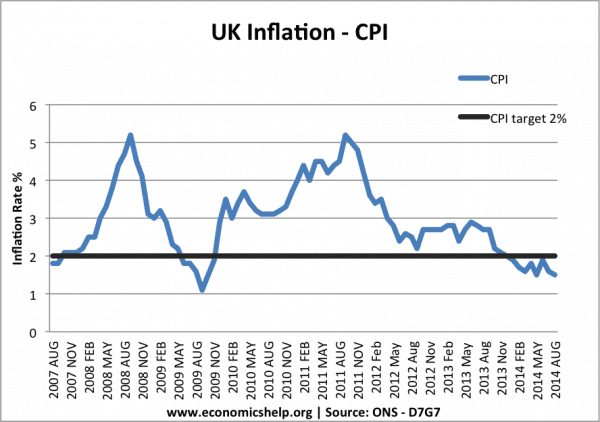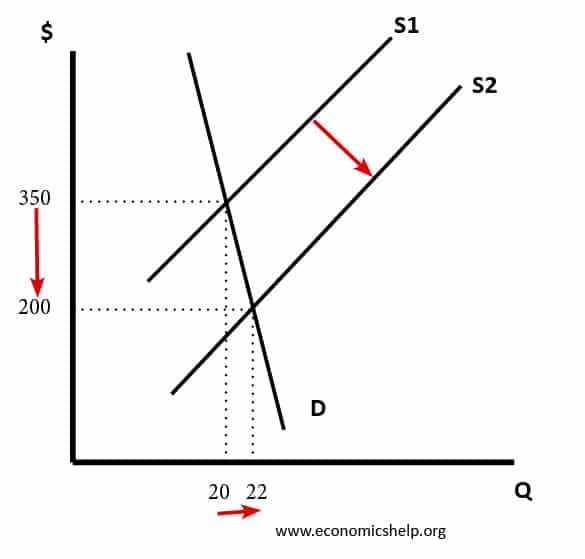Readers Question: Would it be possible for a nation to claim that is reducing inflation rate successfully through economic measures, however at same time is allowing increase of commodities prices such as bread, meat, and etc…
Firstly a fall in the inflation rate, means prices are still rising. Just at a slower rate.

For example in late 2008, the UK inflation rate was falling from 5% to 2%. Prices were still rising at the start of 2009.
Two useful definitions
- Headline inflation rate – measures the overall cost of living. In the UK, the headline rate is measured by the CPI
- Core inflation rate – this measures the inflation rate, excluding volatile factors, such as raw materials (oil and food)
Inflation measures the average cost of living. Therefore, it is possible for some goods to be increasing in price by a greater amount than the average price level.
A common example, is petrol prices rising at 10%, when the headline inflation rate is 4%. If we stripped away petrol from the inflation index, we would get an underlying inflation rate of 3%.
Rising oil prices were a major factor in causing the UK inflation of 5% in 2008.
At the present moment, the fall in oil prices are causing the headline inflation rate to be lower than it would be otherwise. Headline inflation is running at 1% in many European countries, but without the downward pressure from oil, headline inflation may be closer to 2%.
An example of core inflation being more stable than headline inflation
Source: [1. Paul Krugman, New York Times: Core Logic, Still ]
This graph shows that headline inflation is more stable. However, if we exclude energy and food, we had inflation go over 5% and also slip into deflation in 2009.
Food prices
Food prices often change at a greater rate than overall inflation. Food prices tend to be more volatile because they are determined by factors, such as the weather. Also, with inelastic supply and demand, this makes prices more volatile.
If there is a bad harvest in one year, we may see food prices rise quite sharply due to this particular factor. However, at the same time, the underlying core inflation rate could be falling, e.g. due to lower economic growth and a decline in excess demand.
See also: Food inflation
Core inflation
Core inflation is a useful concept because it gives a better guide to the underlying inflationary pressures in the economy – and ignores these more short-term temporary factors like energy and food
However, the headline inflation rate can be influenced by these short-term, temporary factors. If we have a rise in raw material prices, such as petrol and food, this could lead to higher inflation expectations. Workers may demand higher wages to be able to afford the higher prices; this rise in wages could therefore make these short-term cost push factors more permanent.
But, recent history suggests that the cost-push inflation didn’t lead to permanently higher inflation, like some economists / Central Bankers feared.
Different inflation rates
Another issue to be aware of is that different groups of society may be affected by rising food prices in different ways.
The average consumer may spend 15% of their income on food, and so be relatively unaffected if food prices rise.
However people on very low incomes (in developing economies) may spend up to 50% of their disposable income on food. Therefore, if there is food inflation, it affects their cost of living quite significantly. In this case, low income groups have a higher inflation rate that those on high incomes.
Conclusion
To answer your question. Yes, food prices can be rising whilst at the same time headline inflation rate is falling due to policies to reduce demand pull inflation. However, this also shows the headline inflation rate is not everything. We should be concerned about rising food prices, if it leads to a big drop in discretionary income.
Related



superb